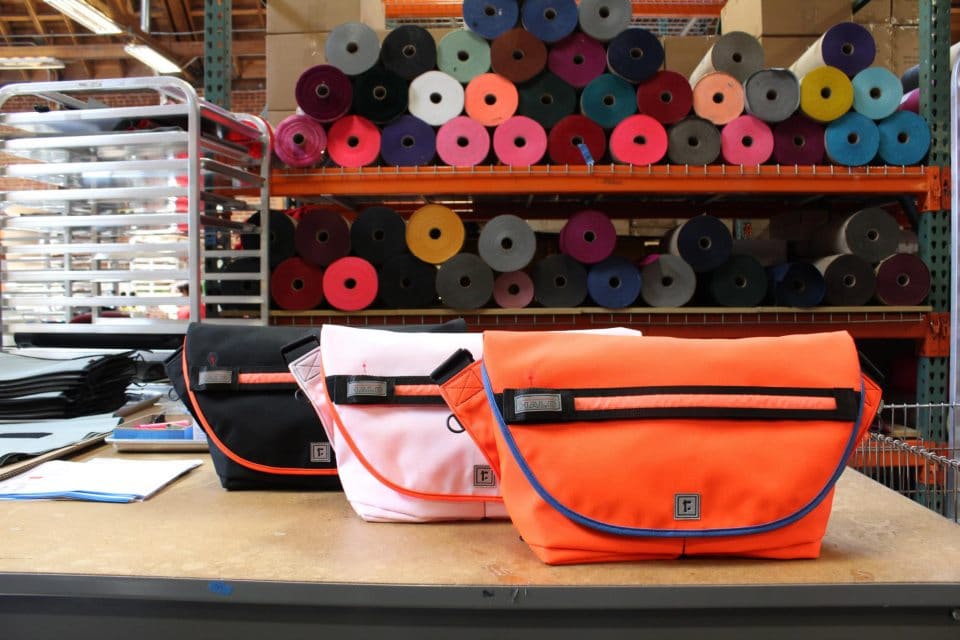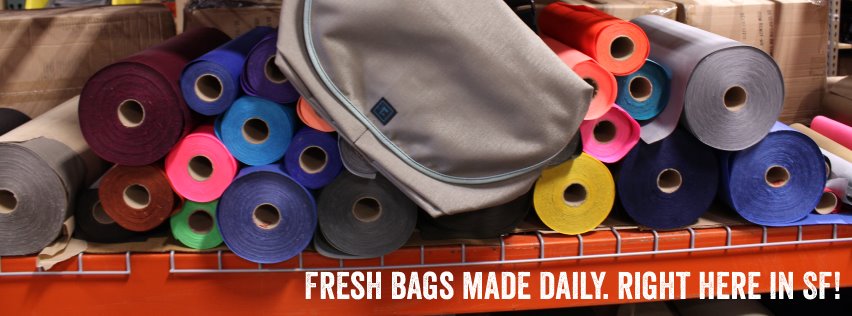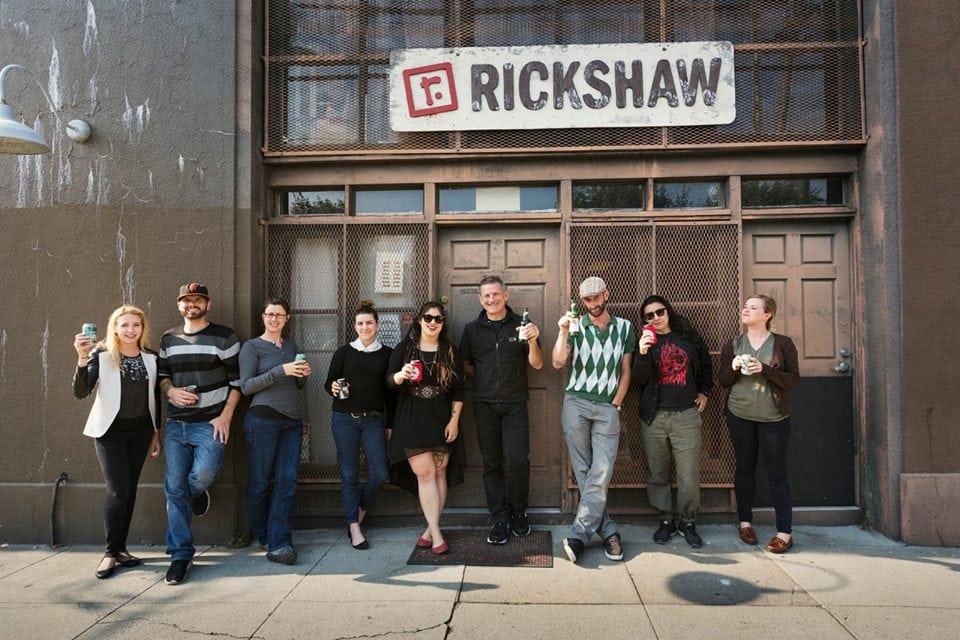It’s about pride in what we do, not about protectionism.
BY MARK DWIGHT
The Case for ‘Made in America’
I proudly add the “Made in USA” label to every product I manufacture in my San Francisco factory. Making bags in this country is fundamentally important to me and to my company–but maybe not for the reasons you think.
Here at Rickshaw Bagworks, making our own products celebrates our passion for making things, not a protest of outsourcing or offshoring. I’m not a protectionist, and I’m not a Made-in-America zealot. We live in the modern global economy–I get it. In fact, my original plan was to import partially made bags from China and do only the final assembly in our shop.
But, alas, I’m a stubborn maker at heart. We soon found ourselves designing products we could produce from scratch in our own factory and getting excellent customer feedback for our made-in-San-Francisco goods. So we encouraged letting our manufacturing story be our crucial point of differentiation: We don’t just design what we sell; we make what we sell.
That’s always been my true love. In high school, I took wood and metal shop classes and started my own stained glass business, crafting windows, lampshades, and terrariums for my parents’ friends. Then I headed off to college, got a degree in engineering, and started working in Silicon Valley. My crafting days were over–or so it seemed. Twenty years later, I entered the bag-making business and reconnected with my dormant passion for making things. As fate would have it, that happened at a time and in a place particularly challenging for makers–but also full of opportunity.

Photo Credit: Rickshaw Bagworks
We live in an age when production is more often than not outsourced to anonymous contract manufacturers, predominantly in low-cost labor markets. There are good reasons for that and some horrific and well-publicized downsides. Though economies of scale and low-cost labor have yielded tremendous cost savings for consumers, it seems we may be approaching the limits of this business model, especially after factory disasters abroad have focused more attention on the poor working conditions and environmental impact of these practices. A small but growing group of “conscious consumers” care about the who, what, why, where, and how behind the products they buy. These customers want to connect with the companies they purchase goods from and share their enthusiasm with others like themselves.
So, does it really matter where it’s made? Yes, and no. I believe it’s less about precisely where we manufacture–though San Francisco has fabulous geographic cachet–than about making our own products in our own factory under our own brand name. It’s about connection and accountability–knowing and dealing directly with the maker and trusting the brand. Here at Rickshaw, we design and make what we sell. We own it. The buck starts and stops right here. Making what we sell is our primary differentiator. “Made in USA” is the where of our brand story.

Photo Credit: Rickshaw Bagworks
As a conscious consumer, I’m concerned about the environmental and social justice issues of manufacturing in less-developed, poorly regulated countries. As a maker, I’m optimistic that there’s a promising future for small-scale, innovative specialty manufacturing in America. In my bags, those “Made in USA” labels are shorthand for “quality products, made with integrity by a company that’s accountable and that cares for its employees, customers, business partners, and community, and for our shared planet.”
This is not something that’s exclusively American. Nor is it universally American. But I like to think it’s fundamentally American.

Photo Credit: Rickshaw Bagworks
U.S. Pork Plant Program Draws Criticism: Hormel Petition
in Consumer Products, Country of Origin (COOL), Production/by The Made in America Movement TeamJan 30 (Reuters) – Processing lines at some U.S. pork slaughterhouses are moving too fast for inspectors to adequately address contamination and food safety concerns, according to an advocacy group that says it has obtained affidavits from four government meat inspectors. Read more
New Balance, Saucony Vying For Soles of Military Recruits
in Jobs, Made in USA, Manufacturing, Military/by The Made in America Movement TeamNearly every piece of gear that military recruits get when they show up for training is made here in the United States — but not their running shoes.
That is about to change, under a policy shift that could have big repercussions in New England. Read more
Military Bids Could Spur More Made in USA Shoes
in Consumer Products, Jobs, Made in USA, Manufacturing, Military/by The Made in America Movement TeamWhat will the ramifications of all-American shoes manufacturing be here in Massachusetts?
Tony Post has a good idea what the answer would be. Read more
The U.S. Medical Device Industry
in Made in USA, Manufacturing, Medical, Reshoring, Sourcing, Sustainability/by The Made in America Movement TeamThe United States remains the largest medical device market in the world with a market size of around $110 billion, and it is expected to reach $133 billion by 2016. The U.S. market value represented about 38 percent of the global medical device market in 2012. U.S. exports of medical devices in key product categories identified by the Department of Commerce (DOC) exceeded $44 billion in 2012, a more than seven percent increase from the previous year. Read more
Check Out New Balance’s Latest ‘Made in the USA’ Sneaker Collections
in Made in USA, Manufacturing & Sourcing, Production/by The Made in America Movement TeamA “Made in USA” label is becoming a more actively coveted item. But local footwear brand New Balance has long been crafting a number of their sneakers domestically. Read more
The Case for ‘Made in America’
in American Made, Made in USA, Manufacturing & Sourcing, Small Business, Sustainability/by The Made in America Movement TeamThe Case for ‘Made in America’
I proudly add the “Made in USA” label to every product I manufacture in my San Francisco factory. Making bags in this country is fundamentally important to me and to my company–but maybe not for the reasons you think.
Here at Rickshaw Bagworks, making our own products celebrates our passion for making things, not a protest of outsourcing or offshoring. I’m not a protectionist, and I’m not a Made-in-America zealot. We live in the modern global economy–I get it. In fact, my original plan was to import partially made bags from China and do only the final assembly in our shop.
But, alas, I’m a stubborn maker at heart. We soon found ourselves designing products we could produce from scratch in our own factory and getting excellent customer feedback for our made-in-San-Francisco goods. So we encouraged letting our manufacturing story be our crucial point of differentiation: We don’t just design what we sell; we make what we sell.
That’s always been my true love. In high school, I took wood and metal shop classes and started my own stained glass business, crafting windows, lampshades, and terrariums for my parents’ friends. Then I headed off to college, got a degree in engineering, and started working in Silicon Valley. My crafting days were over–or so it seemed. Twenty years later, I entered the bag-making business and reconnected with my dormant passion for making things. As fate would have it, that happened at a time and in a place particularly challenging for makers–but also full of opportunity.
Photo Credit: Rickshaw Bagworks
We live in an age when production is more often than not outsourced to anonymous contract manufacturers, predominantly in low-cost labor markets. There are good reasons for that and some horrific and well-publicized downsides. Though economies of scale and low-cost labor have yielded tremendous cost savings for consumers, it seems we may be approaching the limits of this business model, especially after factory disasters abroad have focused more attention on the poor working conditions and environmental impact of these practices. A small but growing group of “conscious consumers” care about the who, what, why, where, and how behind the products they buy. These customers want to connect with the companies they purchase goods from and share their enthusiasm with others like themselves.
So, does it really matter where it’s made? Yes, and no. I believe it’s less about precisely where we manufacture–though San Francisco has fabulous geographic cachet–than about making our own products in our own factory under our own brand name. It’s about connection and accountability–knowing and dealing directly with the maker and trusting the brand. Here at Rickshaw, we design and make what we sell. We own it. The buck starts and stops right here. Making what we sell is our primary differentiator. “Made in USA” is the where of our brand story.
Photo Credit: Rickshaw Bagworks
As a conscious consumer, I’m concerned about the environmental and social justice issues of manufacturing in less-developed, poorly regulated countries. As a maker, I’m optimistic that there’s a promising future for small-scale, innovative specialty manufacturing in America. In my bags, those “Made in USA” labels are shorthand for “quality products, made with integrity by a company that’s accountable and that cares for its employees, customers, business partners, and community, and for our shared planet.”
This is not something that’s exclusively American. Nor is it universally American. But I like to think it’s fundamentally American.
Photo Credit: Rickshaw Bagworks
FROM THE NOVEMBER 2014 ISSUE OF INC. MAGAZINE
Tillman Foundation: Annual Frogman Swim in Tampa Bay Honors Those Who Served
in Military, Veterans/by The Made in America Movement TeamDave Welker never met Pat Tillman. But the 33-year-old Air Force pararescueman, whose job is to recover downed crew members in the toughest conditions, knew the story of the NFL player who gave up a multimillion-dollar career to become an Army Ranger after the tragedies of Sept. 11, 2001.
Read more
THE END OF AMERICAN MANUFACTURING?
in Jobs, Manufacturing/by The Made in America Movement TeamRepost from Conway Goods: a small company committed to American Manufacturing.
We just finished our first year of business. We filed several patents, achieved UL® approval, built a supply chain and launched production. We have almost 80 committed retail accounts and growing. Read more
The Made in America Store Thrives
in Consumer Products, Economy, Jobs, Small Business/by The Made in America Movement TeamJC Penney to close 40 stores in 2015 taking jobs with them
in Jobs/by The Made in America Movement TeamJC Penney said Thursday it will close about 40 stores over the next year. Read more